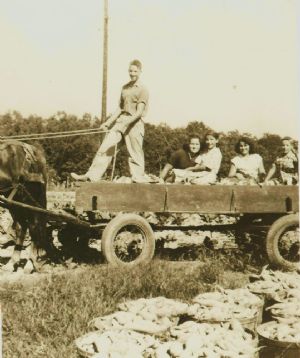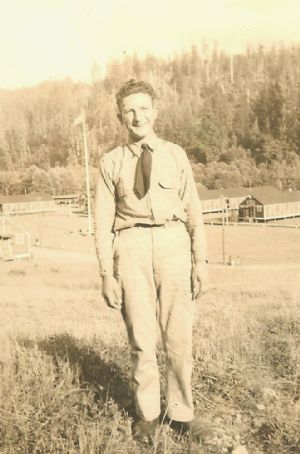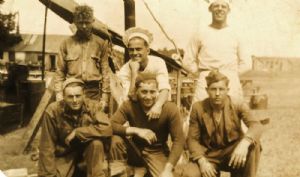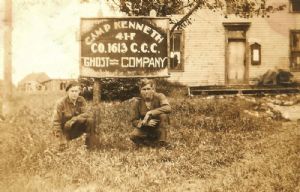Apr 2019 StoryA Code of Conduct Written By Angela Stout April 2019 A code of conduct is derived from Natural Law Theory. Natural Law Theory is a theory that recognizes law and morality as deeply connected. It tells each of us what is right and wrong; what is good and bad. Natural law imbeds in each of us binding rules of moral behavior from nature's or God's creation of reality and mankind. Imbedded into our ancestors was their own unwritten code of conduct. Because most of them could not read or write, where did they get their morality of what was good and bad? Natural Law Theory says that God provided our ancestors with their code of conduct. We should consider what their code of conduct was. Below are some passed down stories from our ancestors to show some (there are many) examples of their own code of conduct. CODE 1: Compassion. (Luke 6:31) As we have discussed in previous stories, life was hard on our ancestors and their neighbors. They were not rich royalty; they were just trying to survive and feed their families. But even in this tough environment, there are stories that demonstrate that Roberts had compassion for others. One such passed down story is of a Roberts man who had already gotten in his corn and filled his crib with corn for winter. On one particularly cold, wintery day a local family had nothing to eat. The family was desperate. Tracks in the snow showed that the father of this desperate family stole some of the Roberts’ corn from the crib. Instead of seeking justice, the Roberts man told the father “I would have given it to you if you just asked” and let the man have the corn for his family. Another story revolves around making moonshine. In the day of moonshine making, the first offense of getting caught making moonshine was 11 months and 29 days in jail but most normally received probation. The next offense was actual federal prison time. Two Roberts men were making moonshine. They got caught and when the revenuers asked whose steel it was, the one Roberts man lied and said it was his. The reason he lied was he had never been caught but the other Roberts man had already had his jail time and this time would go to Federal Prison. He showed compassion by taking the blame himself. Incidentally, he never made moonshine again. CODE 2: Honesty. (Proverbs 12:22 and 2 Thessalonians 3:10) Your word and your name should mean something. At a past Roberts Reunion, the question was asked, “What are the traits that most describe the Roberts reputation?” At the end of the reunion, the answer came back with, “Roberts are honest and hard working.” What a wonderful legacy to leave to our family! Why do you think we have this reputation of being honest and hard working? Consider the civil war pension applications as evidence of being honest. The affidavits were provided by people who knew the applicant. One such affidavit of Alfred Jones states "Mrs. Violet (Roberts) Lee was considered a good loyal citizen during the late war and has always been considered virtuous and truthful honest lady and has since said soldier's death remained a widow." You can find many such civil war affidavits on Roberts’ reputation for being honest and truthful. CODE 3: Strong work ethic. (Proverbs 6:6-8) Roberts have always been known for their strong work ethic. Roberts taught their children how to work hard at everything they did and they grew into self-sufficient adults. A Roberts man lost his wife to cancer. He was left grieving the loss of his wife and a mound of medical bills that he didn’t know how he was going to pay. A church knew his situation and provided him with some money to help pay the medical bills. They had no expectation of getting paid back. Years later, the Roberts man went back to the church and gave them back the money they had given him. He had been taught a strong work ethic and that you paid your way through life. You don’t take handouts. There is a story of a man who was trying to sell a gallon of picked blackberries in Baxter. He wanted $5 for the gallon. One man said, “Man, I wouldn’t pick a gallon of blackberries for $5.” A Roberts man ripped him apart for being so sorry and lazy that he thought he was too good to pick blackberries for that price. The Roberts man appreciated the hard work that went into picking those blackberries and that the man was just trying to make a living by working hard. There are several stories I have heard of Roberts members going out to wherever there was work. The Herald Citizen Newspaper articles are full of letters encouraging people to come to where there was work. We have Roberts that went to Michigan, Oklahoma, Alabama and other places for work and an opportunity to better themselves. Their strong work ethic pushed them to look for these opportunities. There’s also a story of a Roberts family that was going through town in a wagon after working hard day. The girls in the wagon, not wanting to be embarrassed by others seeing them, slouched down in the wagon. The father said, “Sit up straight…we are a working family!” The father was teaching his family that being hard working was something to be proud of. Here’s a working Roberts family…love all the sweet potatoes in front of the picture. CODE 4: Seek to better yourself. While studying our ancestors, you can see many examples of how from the very beginning, they tried to better themselves. Joseph Roberts acquired fifteen acres on Mine Lick Creek on 25 May 1818. He and his wife carved a life out of the wilderness with ten children. He started a blacksmith shop by his house which was useful to those who traveled on the creek road. Joseph Roberts started off with fifteen acres of land. When he died in 1854, he passed onto his children and wife an inheritance of 1,000 acres of land! Early pioneers such as Joseph tried to acquire as much land as they could. Joseph passed down the importance to land ownership to his children. Land records document the buying and selling of land among many of the Roberts ancestors. Though many could not read or write, they worked hard to acquire land. After the Civil War, it is said that Violet Roberts took every penny of her Civil War widow pension into buying more land. Her younger brother, Francis Marion Roberts, was not satisfied with just carving out a life on the creek. He took the opportunity to sell some of his land for a share of the railroad and a switch being built…and thus we have the Roberts Switch community. CODE 5: Take care of family. (1 Timothy 5:8) In challenging times, Roberts have a code of taking care of each other. As we have discussed, the Civil War destroyed families. Men were killed and women looked to ways to survive with the children. In post-civil war censuses, you can see evidence of the Roberts family taking care of surviving family members trying to survive the war effects. Men also had to decide how to take care of children when their wives died, the men having to work for a living, struggled to take care of the children. Consider our family members who survived the depression. Having actual cash was a rare commodity and so many of our family left the farm to find work to provide cash back to their family. Some found work in the Civilian Conservation Corps (CCC). The CCC operated from 1933 to 1942 in the United States for unemployed, unmarried men. The CCC would take 50% of every paycheck to send home to their families. As young men, they tried to contribute to taking care of their family! Eugene Roberts at his CCC camp in Oregon. Clavis Roberts with fellow CCC workers in Camp Kenneth, Michigan.
These are some of the codes that our ancestors lived by. I am sure there are many more to add to this list, but this gets us thinking and being thankful that we have such a rich heritage. Finally, and importantly, I don’t want to paint a picture that we Roberts are perfect. Far from it! We, like every person on the planet, are sinners and fall short of the glory of God. Certainly, we can look at stories that demonstrate our fallen state…but, I’m not going to write that one. So, if you want to know about whiskey making and drinking, infidelity, shootings, etc., come to the reunion where they will be routine topics of conversation. :o) Please continue to spread the word about 2019 Roberts Reunion (31 May – 1 June)! |




